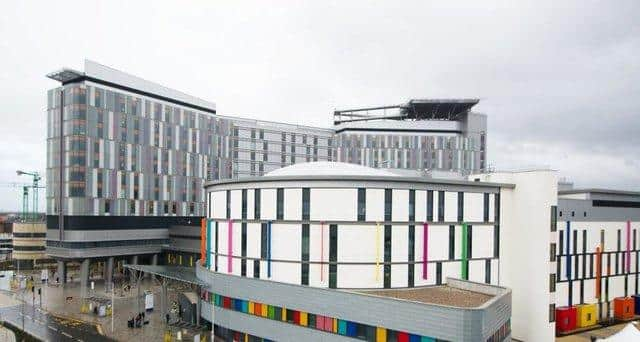Scottish hospital inquiry: 'A building almost killed our son', says father after hospital-acquired infection
Cameron Gough spoke on Monday during the first day of evidence to the Scottish Hospitals Inquiry, which will examine problems at hospitals in Glasgow and Edinburgh that contributed to the deaths of two children.
Mr Gough’s son, now ten, was diagnosed with cancer in July 2018, and treated at the Royal Hospital for Children (RHC) and Queen Elizabeth University Hospital (QEUH) in Glasgow.


Advertisement
Hide AdAdvertisement
Hide AdAfter an operation to remove his kidney, the child developed a hospital-acquired infection that Mr Gough said was the point at which his parents came closest to losing him.
"We steeled ourselves for dealing with cancer and the implications of cancer," Mr Gough told the inquiry.
"What we didn’t expect was to be put in a position where a building almost killed our son. To put it brutally, a hospital-acquired infection was the point we came closest to losing our son."
Mr Gough said at the time he was just grateful his son survived, but the incident “shot his confidence” in the hospital.
"It shot my confidence in the hospital, an awful lot,” he said.
"I felt a lot of responsibility at that point … I needed to be able to look myself in the eye, if he died, and say I did everything I could.”
Mr Gough was “shocked” to discover his son had a hospital-acquired infection, which he described as a “poo bug”.
"When they told us it was a hospital-acquired infection, there was a small bit of us that thought ‘at least it isn’t our fault’, he said.
Advertisement
Hide AdAdvertisement
Hide AdBut he added: “Someone has designed and built a hospital that is not fit for purpose.
"The purpose of a hospital is to provide a safe environment for children and adults to be cared for.
"If someone can put a drain in that drains uphill, or an air-conditioning unit that doesn’t work properly … that isn’t fit for purpose.”
Mr Gough praised the children’s cancer unit at the QEUH known as the Schiehallion unit, but said he encountered problems in other areas with lower standards of cleanliness and less experienced staff.
He described discovering “brown matter” on the bed in a room his son was allocated, and a pair of underpants in the drawer in another.
In one room his son stayed in the air conditioning system did not work, he said, so he used wet towels to try and regulate his son’s temperature.
In another, a fault in the installation of a wet room meant the shower flooded the room with water, which may have passed by the toilet, he said.
Mr Gough said he was “amazed” and “angry” this bathroom had been signed off in the state-of-the-art-hospital.
Advertisement
Hide AdAdvertisement
Hide Ad“I suppose I wasn't so much angry at the time, but retrospectively, when you start saying you’ve got a line infection that occurs with poo, and you have a room that floods potentially poo-y water across the room, I'm not saying that there's a direct link, but A plus B normally equals C,” he said.
"Even if I didn't get caused there to [my son], that’s not acceptable in any infrastructure.”
The inquiry, led by Lord Brodie, was ordered after patients at the Glasgow hospital died from infections linked to pigeon droppings and the water supply, and the opening of the Edinburgh site was delayed due to concerns over the ventilation system.
It comes after an independent review found the deaths of two children at the QEUH were at least in part the result of infections linked to the hospital environment.
The review investigated 118 episodes of serious bacterial infection in 84 children and young people who received treatment for blood disease, cancer or related conditions at the Royal Hospital for Children at the campus.
It found a third of these infections were “most likely” to have been linked to the hospital environment.
Steven Love QC is appearing on behalf of 54 parents or family members of patients, represented by Thompsons Solicitors Scotland, who were or are still being treated on the children’s cancer ward and neonatal unit at QEUH.
Parents were made to feel "stupid and over-anxious” for raising complaints about the hospitals, he said.
Advertisement
Hide AdAdvertisement
Hide Ad"The failure of the hospital to properly address the complaints of parents is something that needs to be addressed and answered by this inquiry,” he said.
"The statements of parents cover a number of other issues that includes the following; refusal or delay to provide medical records; staffing levels for both nursing and cleaning staff appearing to be inadequate for patient-appropriate nursing care and cleaning, provision of medication, which includes examples of over or under dosing of patients as a result of staff being too busy with room moves, which has led to painful consequences for the child.”
In its opening statement to the inquiry, NHS Greater Glasgow and Clyde said: “NHSGGC has the greatest sympathy for the suffering and anguish that has so obviously been experienced by patients and families alike and, against this background, welcomed the announcement made by the-then health secretary in September 2019 that there would be a public inquiry into the issues which have arisen.
"NHSGGC is determined to ensure that the issues which have required to be addressed in both hospitals do not arise in any other future NHS infrastructure project, and it will provide all the assistance that it can to the inquiry to enable it to fulfil its vitally important remit.”
A message from the Editor:
Thank you for reading this article. We're more reliant on your support than ever as the shift in consumer habits brought about by coronavirus impacts our advertisers.
If you haven't already, please consider supporting our trusted, fact-checked journalism by taking out a digital subscription.
Comments
Want to join the conversation? Please or to comment on this article.
